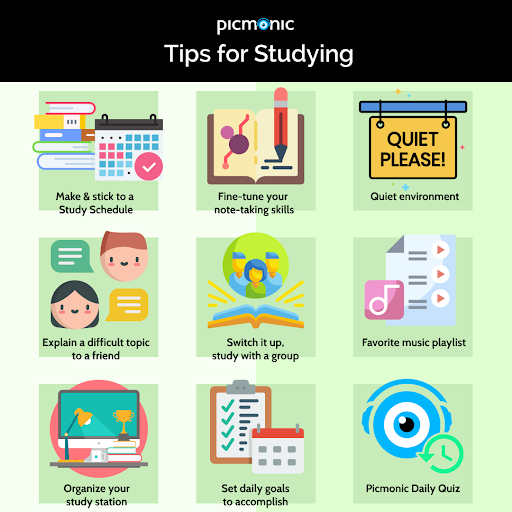Whether you are just getting started studying for the Medical College Admission Test (MCAT) or are ramping up studying efforts as you get closer to the end of your Occupational Therapy (OT) program, there is something here for everyone. We have compiled 9 of the most effective, tried and true study tips. From the easy and basic, to some creative and new study ideas, Picmonic experts are giving you their best here and we know it will help.

1. Make and stick to a study schedule
Plan the work and work the plan. It’s a time-tested method that works in many environments. Think about your other time commitments, how you learn best and retain information, and then create a workable plan for you. Remember you will have to juggle your classes, deadlines, quizzes, and exams which can get overwhelming. The benefits of making a plan is it leads to better productivity, forces you to improve time management and will lead to a better score on tests or exams. So whatever your program, and wherever you are in the process, you’ll want to make sure this is top on your list of study tips.
2. Fine-tune your note taking skills
As you are studying and listening to lectures in college or a graduate school program, your notes will make a big difference. Note-taking remains one of the best ways to help you learn and can improve your scores. First, you need to be organized and intentional: keep all notes in one binder with dividers, have a separate notebook or file on your computer for each class and keep it that way, highlight and outline consistently. Use symbols and abbreviations to help you write or type faster and keep it neat. Be sure to include your specific questions, thoughts or reminders in your notes to help jog your memory.
3. Quiet environment
So, technically the jury’s still out on whether complete quiet or some noise is better for studying. Like most things, this is probably up to the individual. What’s important to remember is that whatever is best for you, stick to it. Don’t try to be a coffee shop studier if you get easily distracted. If you are a traditional college student trying to study, our college study tip would be to find a place away from friends, fun and your favorite activities. Regardless, be sure you will be uninterrupted and focused because while spending ample time studying is important, quality of studying is going to beat quantity.
4. Explain a difficult topic to a friend
Teaching others something that you’re learning really helps. Find a friend or family member (or several) and try teaching them the topics you are learning. Let them ask you all kinds of questions, so you can answer them. Allow them to give you suggestions about presenting the information. If they end up understanding something, that means you understand it too! You might find classmates are good for this if you switch topics with each other. If nobody is up for it, you can still try to teach your dog or cat. They obviously won’t not get it and they may walk away, but you’ll get great practice talking through the information which is really helpful!
5. Switch it up, study with a group
Studying alone may be tempting since there are no schedules to coordinate, but studying with a study group can be a beneficial change in your study routine. Study groups – whether you’re looking for nursing study tips, med school study tips or preparing for your boards – will allow you to learn from others. Discussions at study groups can bring up new ways to think about subjects, can give you a chance to find new resources, provide additional motivation and allow you to share some of your strengths with the group.
6. Favorite music playlist
Music while you study? It’s up to you! If it helps you focus, lifts your mood or energizes you, then music can be a great addition to your study tips here! Make sure whatever your listening to isn’t distracting, though. Music can help reduce stress, which is something we know you will be feeling throughout your semester and program. Studies have also shown that certain music can help you pay attention better. Again, not all music will necessarily do all things. If your motivational music is a little T-swift, it may or may not help you focus. Likewise, Bach or Yo-Yo Ma may help your stress levels decrease but may not pump you up after a rotten practice test.
7. Organize your study station
We realize that there are three groups of students: neat and organized, everything is everywhere and you love it that way, or somewhere in-between. Listen up – you need to keep your study station organized. Don’t argue with us here! Maybe you graduated undergrad with a 4.0 and your desk and notes on your laptop were a mess. That’s a fun story, but get yourself organized! You are asking too much of yourself right now to learn and retain information in school while also having your information disorganized. Get organized for improved efficiency, lower stress and making more space to keep crushing your goals!
8. Set daily goals to accomplish
Are you one of those people who gets excited crossing items off your To Do List? Turns out there is actually something to that kind of satisfaction. That feeling of completion is good for you, your productivity, keeping yourself organized and staying on that study plan you made in step one of our study tips! We like setting some daily goals either the day before or that morning and then sticking to them.
9. Picmonic daily quiz
There’s a reason why whether you’re looking for nursing school study tips, medical school study tips, OT study tips or any other healthcare field, you will hear people recommend Picmonic’s daily quiz. Keeping up with the Picmonic daily quiz is important to do every single day. Our quizzes are designed to help you overcome the forgetting curve and maximize your retention with spaced repetition.
Picmonic is here for your courses, daily quizzes and on-the go studying with our Picmonic app. We know wherever you are in your healthcare career, it is important to stay motivated, keep your “Why” close by, and know where to turn for the best studying support throughout your journey. You’re on a great path toward your future career. It’s going to take hard work, making great study habits and returning to these study tips if you get into a rut, but Picmonic is here to help you succeed. Try it for free today to get started.
We’ve listed some of the top-notch studying tips for you to pass life-changing exams as a healthcare student, but we know you may have some more questions. Luckily, we’ve got all the answers to your frequently asked questions.
How do medical and nursing students memorize so much?
There’s no doubt that medical and nursing students need to memorize and absorb a vast amount of information throughout their careers. And if you decide to take it to the next level to go to PA or NP school, hats off to you!
The most effective memorization occurs with mnemonics as well as using visual learning and auditory study methods. For nursing students, this may be acronyms like ADPIE and for med school students, the infamous SOAP! Additionally, nursing or medical podcasts, catchy rhymes and jingles, or concept maps help a great deal with memorization as well.
How do people study in med and nursing school?
Nursing school, med school, PA, and NP students use a ton of helpful study resources like Picmonic or studying tips like the ones we’ve compiled above! The most common advice we hear from healthcare students is to review materials regularly. This includes your notes, practice tests, books, and more.
In all honesty, studying efficiently looks different for everybody. The best study methods you’ll determine on your own–but to start off, we recommend finding the right learning environment for you and trying out a study group amongst your peers. If you want to take a few practice tests before you take a life-changing exam, like the NCLEX, USMLE step 1, or PANCE, check out Truelearn to help you pass on your first try.
How many hours should a nursing student study?
The jury’s still out on this one. Some say three to four hours a day, others say three hours per credit hour, and some say five to six hours at the very least. We recommend re-evaluating your study habits and finding the best balance between studying, courses, and sleep. Sleep is necessary for your brain to process and retain important information, and for you to pass your next big exam and succeed in nursing school.
How about a medical student? It depends on what year you’re in. If it’s your first year in med school, you may not spend as much time studying as a third year. Some med school students study over eight hours a day, but we’ll say keep it between three to four every weekday. Again, sleep is of the utmost importance leading up to exams. Don’t be tempted to cram or overexert yourself on studying (or loading up on excess amounts of caffeine). Keeping balance is key.
Is nursing and med school mostly memorization?
Nursing and med school students rely heavily on memorization, but there are additional aspects of knowledge and critical skills at play. Memorization helps PA, NP, nursing, or med school students remember processes and key information required for diagnosis, treatment, and more, but overall, they must have a grasp on medical concepts and how to apply them to real-life situations. Memorization will only get you so far, and practice with the application of learned concepts makes the best medical professional.
What are some top tips to succeed in nursing or med school?
Create a study schedule, master your learning objectives, and use the tips we listed above to not only ace your big exam or quiz but to become the greatest nurse, doctor, PA, or NP! With the right amount of practice and study tools, you’ll be successful in your academic journey.













